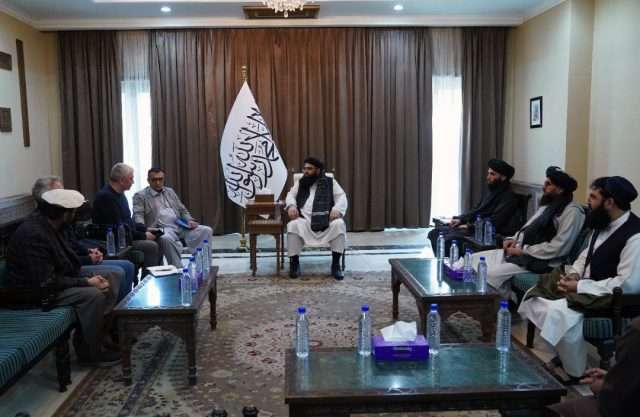
Author: Giuliano Bifolchi
During the last few days, Russian companies have shown interest in supporting the TAPI pipeline project and the Taliban in repairing their helicopters and training personnel highlighting the Kremlin’s strategy in Central Asia and Afghanistan.
The deputy head of the Taliban for political affairs, Abdul Kabir, met with representatives of Russian helicopter companies and discussed issues of cooperation with them. According to Taliban spokesman Inamullah Samangani, Abdul Kabir held talks with Vladimir Skurikhin, CEO of Vertical-T, and Alexander Kalachev, chairman of the board of the helicopter repair company.
Samangani noted that the Russian side expressed its readiness to cooperate on the repair of helicopters and the training of technical personnel. At the same time, Abdul Kabir said that security has now been established in Afghanistan, and favourable conditions have been created for foreign investment.
Last week, the Russian ambassador to Asghbat, Alexander Blokhin, said in an interview with TASS that Russian companies are interested in implementing the TAPI project. This natural gas pipeline interests Turkmenistan, Afghanistan, Pakistan and India.
“The construction of this gas pipeline does not infringe on the interests of the Russian Federation, so we do not oppose the project and wish the Turkmen success in implementation. As for Russian companies, they are interested, and we have every opportunity to supply pipes, compressors, and other components for this project,” he said.
The diplomat stressed that Russian companies had already supplied pipes for this gas pipeline, part of which was laid through the territory of Turkmenistan, adding that “it was a $300 million project last year.”
Blokhin noted that both the Taliban and Turkmenistan would like to implement this project. However, in his opinion, it will not be so easy since security and financial issues will have to be addressed. Recall that earlier Pakistani media reported that the Asian Development Bank suspended work on implementing TAPI until the world community recognised the Taliban government.
Meanwhile, the Taliban have said they intend to continue the project, despite the suspension of ADB participation in it.
Why does it matter?
The Russian Federation considers Central Asia as part of its blizhnee zarubezhe (near abroad), where the Kremlin aspires to extend its influence, military and economic presence. At the same time, especially after the U.S. troops’ withdrawal from Afghanistan and the Taliban’s rise to power, Moscow has become more active in the AfPak region to strengthen its cooperation with Kabul and Islamabad and avoid Washington’s soft power.
Supporting the TAPI natural gas pipeline is part of the Russian foreign policy in the region because this project interests both Turkmenistan and Afghanistan and might avoid that Ashgabat turns its attention to the West and will take part in the Transcaspian Pipeline (TCP), which might help the European Union to diversify its gas imports. Taking into account the current situation in Ukraine and the confrontation that Moscow has with Brussels regarding the North Stream 2 and gas supply (Ukraine conflict, natural gas pipelines and Russian strategy; Russian invasion of Ukraine and economy), avoiding any possible alternative gas route is part of the Kremlin’s project to maintain its grip on Europe. At the same time, Russian involvement in the TAPI project might strengthen Moscow-Kabul relations and allow Russian companies to become more active in the Afghan territory, which is rich in natural resources.
Backing the TAPI project allows Moscow to reinforce its role in Turkmenistan since Ashgabat is hugely interested in the Afghan energy market, promoting both the TAPI natural gas project and the Turkmenistan-Afghanistan-Pakistan (TAP) Power Interconnected project. Indeed, in the last days, the President of Turkmenistan Gurbanguly Berdimuhamedov, allowed the Turkmen energy Turkmenenergogurlusyk to conclude an agreement with the Afghan company De Afghanistan Breshna Shirkat to design, supply, construct, install, test and commission outdoor switchgear at the Nur el-Jahad power plant, located in the Afghan province of Herat.
In addition, the Russian companies’ cooperation with the Taliban in the field of repairing and maintaining helicopters and training personnel might further reinforce Kremlin’s dialogue with Kabul and, in the future, allow the Russian Federation to sell its military hardware and products to the Taliban interim-government which declared the will to create a stronger army to face internal problems such as the National Resistance Front (NRF).
On April 6th, 2022, SpecialEurasia has organised the Webinar “Afghanistan: interessi geopolitici, crisi umanitaria e sicurezza” to discuss current geopolitical, humanitarian and security dynamics with our experts and colleagues of Afghanistan. During the event, some of our analysts will present their monitoring activities and findings on Russian strategy in Afghanistan and the future of the TAPI project.
